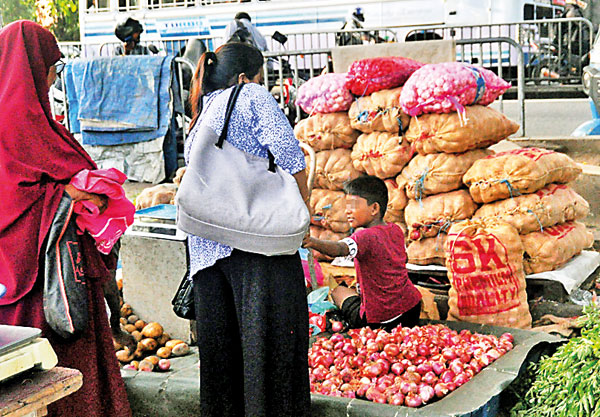News
Battle against child labour: We may not have resources but we have the will , says NCPA
View(s):By Hafsa Sabry
As the world observed International Day Against Child Labour June 12, Sri Lanka finds itself grappling with an escalating crisis.
To commemorate the day, the National Child Protection Authority (NCPA) has organised a series of programmes and awareness campaigns, highlighting the critical need to address the underlying socio-economic issues that perpetuate child labour in the country.
The process often begins with a complaint—a neighbor’s concern, a teacher’s suspicion, or an anonymous tip. Immediately, a multi-disciplinary team is mobilized. This team includes a police officer, a labour officer, and a child protection officer. Their mission is to verify the report and ensure the child’s safety.

Child labour is prevalent in unregistered workplaces such as small boutiques, construction sites, and roadside shops. Pic by Nilan Maligaspe
The child might have experienced abuse from their employer, including verbal and sexual abuse. That’s why the police officer is included in the team deployed for investigation. Child protection officer assesses any trauma the child has endured. Highly trained professionals fluent in all three languages are available. Every district secretariat has a child labour protection officer to address this issue in the country, says, Director Legal, NCPA Preetika Sakalasooriya.
“Every time we receive a complaint, we understand that a child’s future might be at stake,” says the officer. “We prioritise these cases, conducting thorough investigations to understand the child’s circumstances and ensure their safety.”
Upon arrival, the team engages in a meticulous process of interviews and assessments. They speak with the child, their family, and if applicable, the local school principal. “We often find that poverty, lack of awareness about education, and sometimes the child’s disabilities are the main reasons,” the officer explains. “Our job is to address these root causes and find sustainable solutions.”
Though the law does not allow for financial assistance beyond essentials like school bags or uniforms, the team does its best to connect families with additional resources through NGOs and local businesses. “We may not have all the resources, but we have the will and determination to make a difference,” says Ms Sakalasooriya.
While responding to complaints is critical, the battle against child labour lies in prevention. This is where the Child Labour Protection Officers focus a significant part of their efforts. The goal is to keep children aged 5 to 16 in school and away from potential exploitative environments.
“We visit communities, educate parents about the importance of schooling, and monitor at-risk children to ensure they remain in school,” says, another officer involved in preventive measures. “Our presence is a reminder that child labour is unacceptable and that every child deserves the compulsory education between 5-16.”
The officers face a challenging task as child labour is prevalent in unregistered workplaces such as small boutiques, construction sites, and roadside shops. Yet, the team remains undeterred. “When we receive complaints about children in these conditions, we intervene immediately and work with the police to investigate and rescue them,” the officer asserts.
NCPA officers collaborate with a range of stakeholders, including big private businesses, NGOs, and government agencies. This network provides a safety net for children, offering educational support and, in some cases, finding foster families when children cannot return to their own homes.
“The cooperation of local businesses and the CSR projects they conduct is invaluable,” says the officer. “They help fund educational programmes and provide the necessary resources to support these children in the long term.” Despite receiving 200 to 250 complaints annually, only a handful result in successful rescues and sustained support. Some cases are not valid, and some are baseless. “Each successful case is a victory, but the struggle continues,” the officer notes. “The numbers may not always reflect our efforts, but each child we help is a step toward a better future.”
If you suspect a child is being forced into child labour, report it immediately by calling the helpline, 1929. “Your action can make a difference in a child’s life. Together, we can build a future where every child has the opportunity to thrive,” the officer says.
The best way to say that you found the home of your dreams is by finding it on Hitad.lk. We have listings for apartments for sale or rent in Sri Lanka, no matter what locale you're looking for! Whether you live in Colombo, Galle, Kandy, Matara, Jaffna and more - we've got them all!

